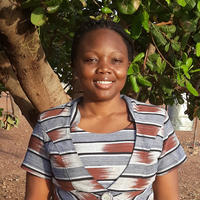
Eugénie Maïga
Dr. Eugénie Maïga is a renowned academic in Burkina Faso who focuses on issues related to education and health, particularly of women and girls, and their connections to family well-being and economic development in Africa.
After completing her Ph.D. in applied economics at the University of Minnesota in 2010, Dr. Maïga decided to return to Africa to conduct research that would contribute to economic growth and poverty reduction. She spent several years as an economist at the African Center for Economic Transformation in Ghana, then moved back to her home country of Burkina Faso to become an assistant professor at the Université de Koudougou, now called the Université Norbert Zongo, where she has since been promoted to associate professor and head of the economics department.
Dr. Maïga has received many accolades for her work. She was awarded Burkina Faso’s “Chevalier de l’Ordre des Palmes Académiques” for her contributions to higher education, and was selected for the first cohort of the World Bank’s Africa Early Years Fellowship, which is designed to support young African researchers. Dr. Maïga was also the first woman to ever pass the professorial competitive examination in Law and Political Science, Economic and Management Sciences administered by the African and Malagasy Council for Higher Education, ranking first out of 37 candidates.
Her research across Africa focuses on increasing youth employment, reducing hunger, and supporting economic growth and transformation. She also excels in teaching, advising graduate students not only in Burkina Faso but also in neighboring Côte d’Ivoire.
In Burkina Faso, only 26 percent of adult women are literate and less than 2 percent finish secondary school. In naming Dr. Maïga as a recipient of the Distinguished Leadership Award for Internationals, the selection committee recognizes how she is changing the norms and expectations of women’s roles in economics, in universities, and in public service.
 Global
Global